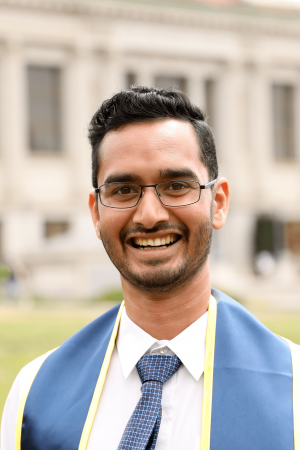Student Talks
Advancing Multimodal Sensing and Robotic Interfaces for Chronic Care
Abstract: The healthcare system prioritizes reactive care for acute illnesses, often overlooking the ongoing needs of individuals with chronic conditions that require long-term management and personalized care. Addressing this gap through technology can empower patients to better manage their conditions, enhancing independence and quality of life. Multimodal sensing, incorporating inertial, acoustic, and vision-based sensors, within [...]
Low-Cost Multimodal Sensing and Dexterity for Deformable Object Manipulation
Abstract: To integrate robots seamlessly into daily life, they must be able to handle a variety of tasks in diverse environments, like cooking in restaurants or tidying up around the house. Many of the items in these environments are deformable such as fruits or bed sheets and a certain level of dexterity is necessary to [...]
Mass-Constrained Robotic Climbing on Irregular Terrain
Abstract: Climbing robots can operate in steep and unstructured environments that are inaccessible to other ground robots, with applications ranging from the inspection of artificial structures on Earth to the exploration of natural terrain features throughout the solar system. Climbing robots for planetary exploration face many challenges to deployment, including mass restrictions, irregular surface features, [...]
Towards Annotation-Free Visual-Geometric Representations and Learning for Navigation in Unstructured Environments
Abstract: Navigation in unstructured environments is a capability critical to many robotics applications such as forestry, construction, disaster response and defense. In these domains, robots have the potential to eliminate much of the dull, dirty and/or dangerous work that is currently performed by humans. Unfortunately, these environments pose a unique set of challenges for navigation [...]
Stabilizing Reinforcement Learning in Differentiable Multiphysics Simulation
Abstract: Recent advances in GPU-based parallel simulation have enabled practitioners to collect large amounts of data and train complex control policies using deep reinforcement learning (RL), on commodity GPUs. However, such successes for RL in robotics have been limited to tasks sufficiently simulated by fast rigid-body dynamics. Simulation techniques for soft bodies are comparatively several [...]
Informative Path Planning Toward Autonomous Real-World Applications
Abstract: Gathering information from the physical world is critical for applications such as scientific research, environmental monitoring, search and rescue, defense, and disaster response. Autonomous robots provide significant advantages for information gathering, particularly in situations where human access is constrained, hazardous, or impractical. By leveraging intelligent algorithms, these robots can efficiently collect data, enhancing decision-making [...]
Robot Safety Beyond Collision-Avoidance
Abstract: It is common to equate robot safety with “collision avoidance”, but in unstructured open-world environments, a robot’s representation of safety should be much more nuanced. For example, the household manipulator should understand that pouring coffee too fast will cause the liquid to overflow or pulling a mug too quickly from a cupboard will cause [...]
Investigating Compositional Reasoning in Time Series Foundation Models
Abstract: Large pre-trained time series foundation models (TSFMs) have demonstrated promising zero-shot performance across a wide range of domains. However, a question remains: Do TSFMs succeed solely by memorizing training patterns, or do they possess the ability to reason? While reasoning is a topic of great interest in the study of Large Language Models (LLMs), [...]
Learning from Animal and Human Videos
Abstract: Animals and humans can learn from the billions of years of life on Earth and the evoluNon that has shaped it. If robots can borrow from that wealth of experience, they too could be enabled to learn from the experience, instead of learning through brute force trial-and-error. Learning from internet-scale videos, such as the [...]
Learning Efficient 3D Generation
Abstract: Recent advances in 3D generation have enabled the synthesis of multi-view images using large-scale pre-trained 2D diffusion models. However, these methods typically require dozens of forward passes, resulting in significant computational overhead. In this talk, we introduce Turbo3D, an ultra-fast text-to-3D system that generates high-quality Gaussian Splatting assets in under one second. Turbo3D features a [...]






